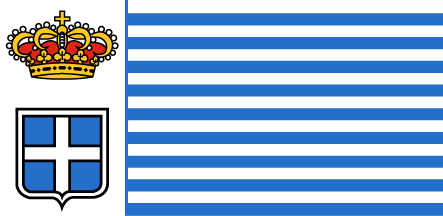
image by Graham Bartram, 24 July 1997

Last modified: 2021-08-24 by rob raeside
Keywords: seborga | italy | st. bernard | cross | crown | stripes |
Links: FOTW homepage |
search |
disclaimer and copyright |
write us |
mirrors

image by Graham Bartram, 24 July 1997
See also:
Other Sites:
I have received the new flag of Seborga from the
Principalities Internet Office.
Graham Bartram, 24 July 1997
You can have informations about Seborga at <www.seborga.info>
.Regarding the flag and according to World Flag Database
maintained by Graham Bartram at <www.flags.net> the flag of
Seborga has been changed in1997.
Pascal Gross, 15 June 1998
Article about Seborga (in Swedish) at <www.reseguiden.se>
with detailed picture of
the Seborga flag.
Christian Berghänel, 1 December 2005

image by Željko Heimer, 3 April 1996
Belize has 'SUB UMBRA FLOREO', Seborga
'SVB VMBRA SEDI'. Also, the shape of the arms is strikingly
similar to the former royal arms of Serbia, Montenegro, Greece
and Italy.
Željko Heimer, 7 March 1996
The motto of Seborga is "sub umbra sedi" which
translates to "sit in the shade"!
The arms in the flag are derived from those of the order of St.
Bernard.
Graham Bartram, 24 July 1997
According to Roberto Breschi presantation titled: "The
Small Italian States Which Lasted Beyond 1700" at ICV 19
(York,2001), Until 1729 the flag in use was a diagonal divided
(upper hoist-low fly) blue over white, just like we got in above,
but without the arms.
Dov Gutterman, 2 August 2001
On 21 May 1995, the news programme 'ARD Weltspiegel' (German
television) reported from the 'indipendent Principato di Seborga'
at the foot of the Ligurian Alps in Italy (near the border with
France).At the end of April, the majority of the inhabitants (304
against 4) of this tiny village voted in favor of independence.
Jos Poels, 14 June 1995
Giorgio Carbone, the so-called "prince" of Seborga,
claims the independence of that village, but it had been annexed
by the Kingdom of Sardinia (ruled by the House of Savoia) on 20th
January 1729. Before that date the village wasn't a Principality,
but a feud of the Cistercian Order. The inhabitants might have
voted for the independence in an illegal referendum made by Mr
Carbone, but they still vote in the legal elections of the
Republic of Italy, as demonstrated by at <www.parlamento.it>
(in the elections of the Senate on 13th May 2001 the affluence of
voters was of 84.21 %). And the mayor, Franco Fogliarini,
democratically elected by the citizens of the municipality of
Seborga on 13th May 2001, is openly against the independence of
Mr. Carbone's "Principality", as demonstrated by his
interview in article at <www.lapadania.com>.
Guido Abate, 7 November 2002
The Principality of Seborga (in Italian: Principato di
Seborga) is a tiny "State" within the borders of the
Italian region of Liguria. Like other small entities, it is not
officially recognized by the main part of the countries in the
world (I'm not sure if any of them recognizes it, maybe
Switzerland or Monaco). Its currency is the "luigino"
which has the value of US$6. However, euro is of course, valid
there, as it is officially part of the Italian Republic (and
Seborga has its elected mayor, too). You can spend luigini also
in neighbouring villages and even in the Ligurian Riviera. For
further infos: <seborga.net>.
Paolo Montanelli, 27 December 2003